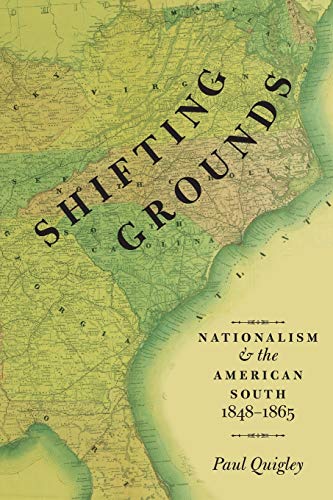Quigley, Paul. Shifting Grounds: Nationalism & the American South, 1848-1865. Oxford: Oxford University Press, 2012.
At some point in college–whether in a formal discussion of the Civil War Club or in one of the countless informal salons conducted in our house common room–I remember turning over the thought of whether the American Civil War could be considered the last wave of the 1848 Revolutions. On the face of it, the assertion is clearly mistaken; the causes, course, and consequences of the Civil War are almost the mirror opposite of the ‘48s, but that does not mean there isn’t a thicket of connection between these events, from contention over the nature of republicanism to the defense of personal liberty, however defined. In Shifting Grounds, however, Paul Quigley comes to grips with perhaps one of the more enduring of those connections: the creation and sustenance of a unique Southern nationalism.
Rejecting more limited models that would define nationalism as either present or not, Quigley frames his work as a study of the formation and maintenance of a national identity that was constantly being negotiated, shifting back and forth between the old and the new, unionism and secession, trans-Atlantic camaraderie and racist isolation. Shifting Grounds is at its best when Quigley delves into these comparisons. The idea that Southern nationalism must of necessity have drawn heavy inspiration from the nationalist ideas of the United States seems obvious, but the manner in which that manifested, from competing claims to the legacy of the Founders to arguments that the Confederacy, not the Union, owned the Stars and Stripes, is fascinating. So too are the many interactions between the intellectuals of the 1848 Revolutions, later nationalist unification of Italy, and Confederate writers; a surprising number of European luminaries agreed with Southern claims to be defending personal liberty, and the necessities of creating nationalism–singularity of culture, existence of national traditions and literature, and so forth–were governed by the expectations laid out in the previous decades across the Atlantic.
Quigley doesn’t stop with Southern nationalism itself, however. Shifting Grounds deals heavily with what is called “active nationalism:” the efforts by individuals in not only creating the nation, but negotiating what the nation expects of them and, crucially, what they can expect from the nation. This draws in avenues of inquiry as varied as the size and role of government, gender norms, even senses of Victorian morality and sacrifice generally perceived. As one might imagine, it can be hard to keep sight of the main idea with this many enticing narrative paths to tread, and while Quigley does at times seem to stray from the path, he always finds his way back to his main topic in ways that make tangents seem, if not unnoticeable, at least forgivably interesting.
My biggest reservation towards Shifting Grounds comes not from anything on the page, but from what is left out. Much of the formation of Southern nationalism came, unsurprisingly, from a sense of victimhood at the hands of a supposedly oppressive, overreaching North. Perhaps in the interest of preserving space (the book comes in at a trim 218 pages considering the breadth of its subject), Quigley focuses almost exclusively on the Southern sources creating this victimhood and does not meaningfully point out that much of it was just that–created. This makes Shifting Grounds a potentially negligent, even dangerous, work of history: in the hands of a reader unfamiliar with the historiography of sectionalism or the many ways in which the South had subverted American democracy for its own ends, it could transform into someone’s introduction to or support for the perpetuation of that same victimhood that today is known as the Lost Cause.
Shifting Grounds has nevertheless become a quiet anchor of my American Civil War shelf. Its take on the rhetoric and social perception of the sectional conflict from the Southern perspective lends gratifying nuance not just to the period in question but to how much of later American identity has been shaped and argued, even up to the present day. Not only that, it can readily serve a fantastic primer to all manner of 19th-century subjects, from political philosophy to geopolitics to race and gender relations. One just has to make sure its readers are given a proper introduction to the period, lest it become something it’s not.
